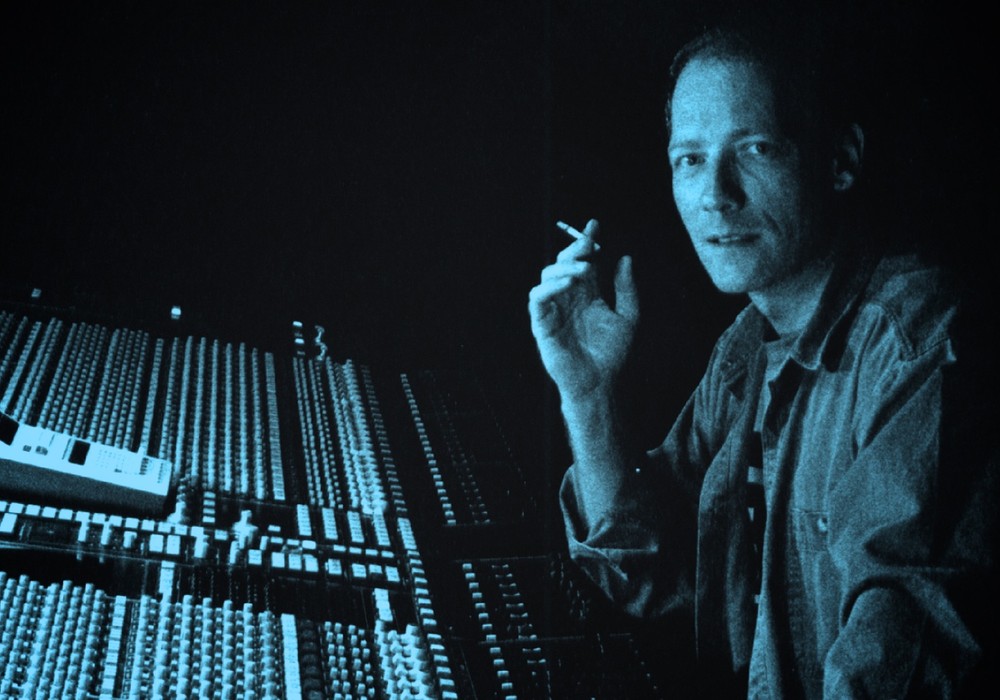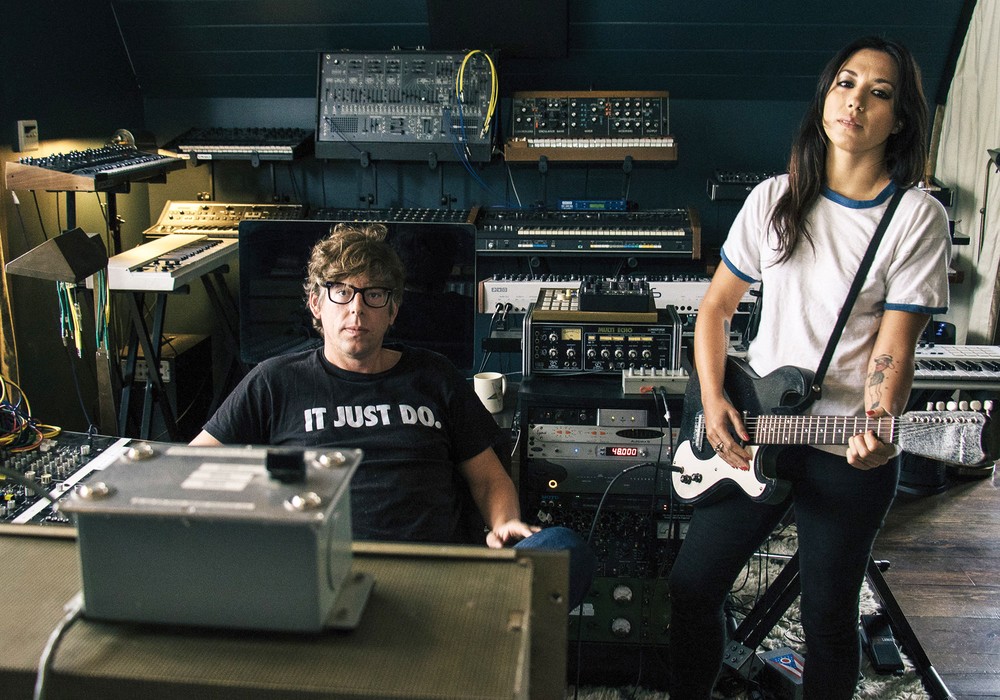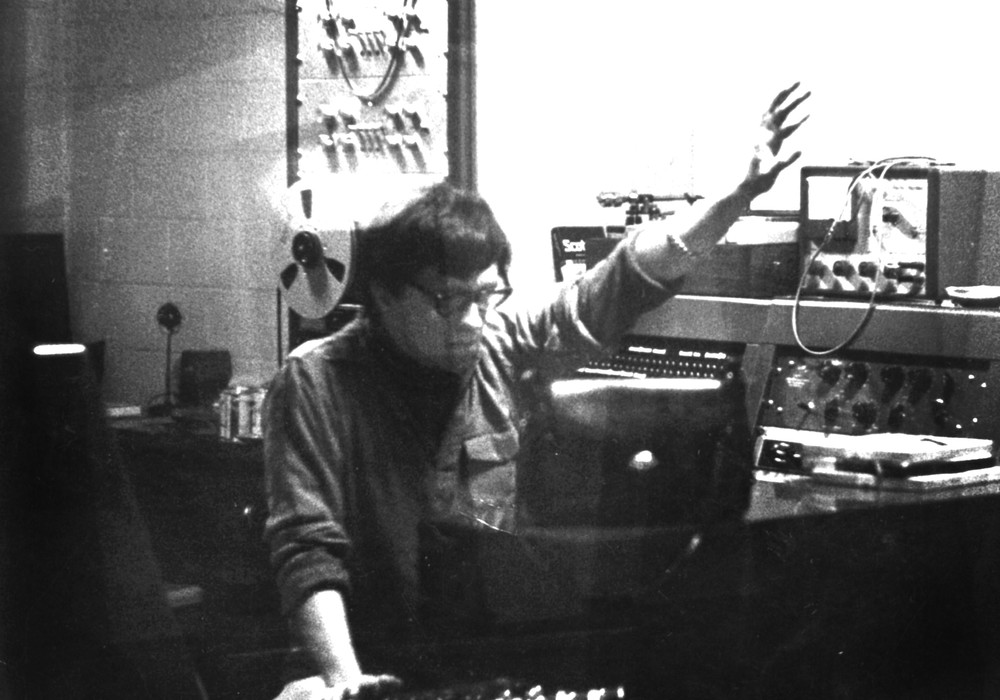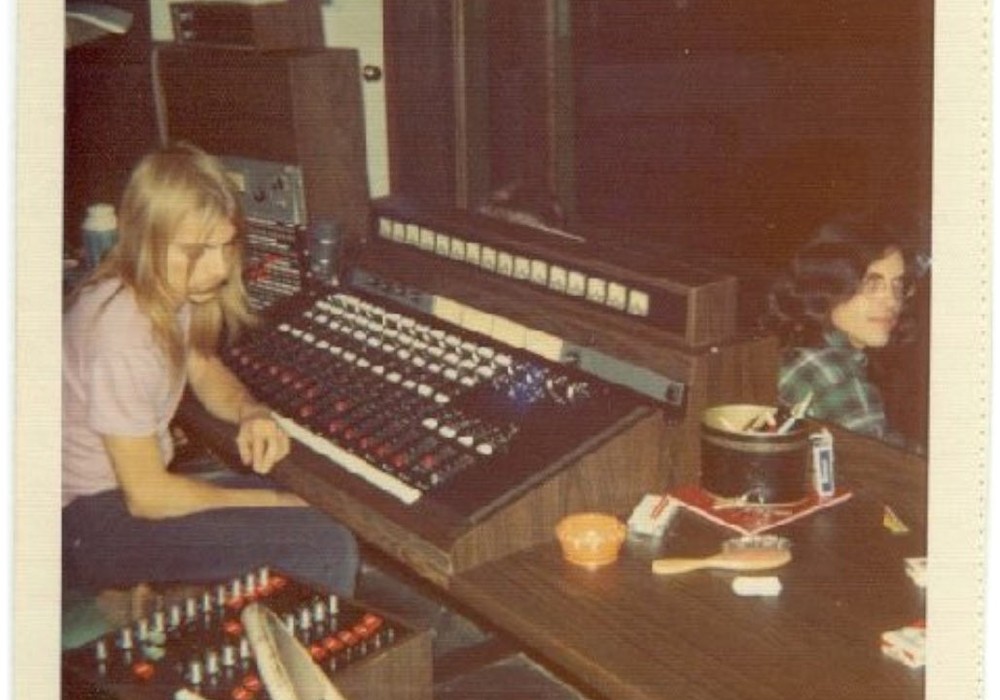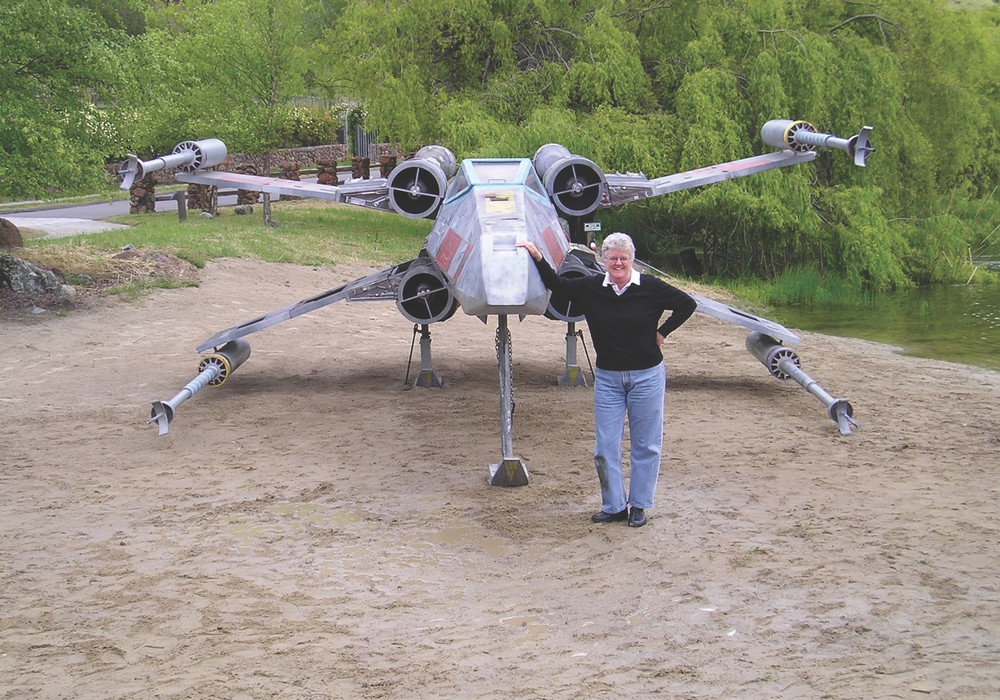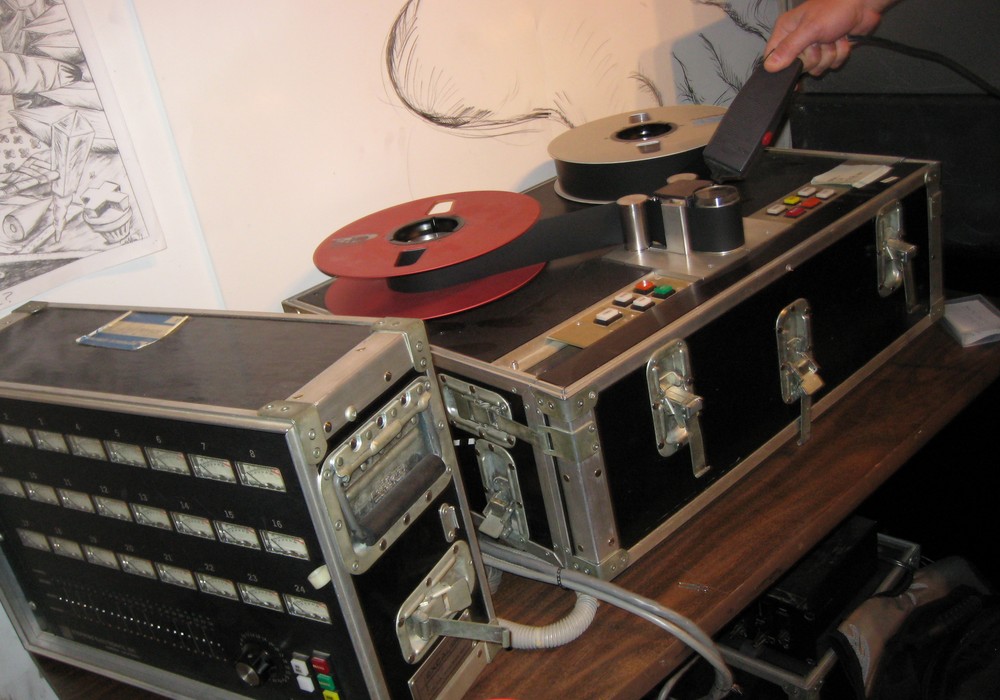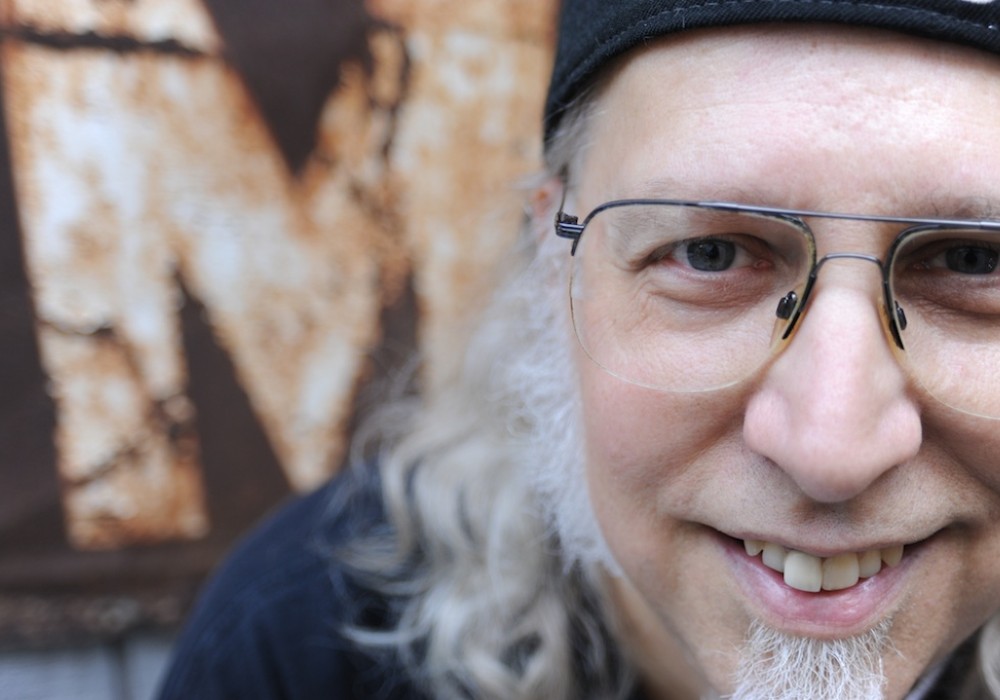In issue 81 of Tape Op, in January 2011, we interviewed John Congleton for the first time. John and Tape Op have stayed in touch ever since. And as his career has taken off, he’s produced records for St. Vincent, Kimbra, Angel Olsen, Blondie, Goldfrapp, Swans, Nelly Furtado, and Chelsea Wolfe. John and I met up at my studio, Jackpot! Recording, while he was in town producing The Decemberists’ upcoming album I’ll Be Your Girl. It’s always great to hang and chat with John, and his endless quest for creativity in the studio is certainly infectious.
I printed out your AllMusic. This is great. This is since 2011, right? I look at some of these years, and I know everything’s always cascaded from the time before a release comes out, but there have been some years here where you’ve just been like nonstop, right?
I don’t feel like I’ve ever stopped since I was 19 or something.
It’s kind of crazy. That’s a lot of sessions. That’s a lot of production.
Yeah! I don’t have much else to do. I don’t have any other hobbies.
You have no children?
I have no children.
Do you have a relationship?
I have a girlfriend, yeah, and she’s very understanding.
Yeah, apparently. I know, because I have to spend part of my time doing the magazine and part of the time doing this. This kind of output is just a lot of constant work.
Well yeah, I do work all the time, but also I work really fast, I think, comparatively to a lot of other dudes and dudettes. I make records a little quicker.
Because of our roots, when we had no money?
Absolutely. I made records in basically a vacuum for almost ten years that almost nobody heard for no money, and I really am grateful for that, personally. I was able to make a billion bad records that nobody heard.
A few good ones in there.
Maybe a few good ones in there. But by the time I actually started to work with bands with immense talent, I kind of knew what I was doing pretty well. Also, I’m grateful that I had real chops, real legit engineering chops, before I really was in a situation where people were really counting on me, you know what I mean? I was, I’d go and say a fairly accomplished engineer, long before I was ever asked to produce anything. So I didn’t even really want to be a producer. I just wanted to record records. People just sort of started asking me to produce. Strangely enough, that’s actually when my career really started, when I was actually starting to feel like I was getting steady work.
What would you say the first batch of records or artists who helped make that happen for you were?
There’s a distinct line I can draw. I did a record for this band that very few people remember called 90 Day Men. They were an incredibly unique band from Chicago. It was one of the only bands I’d ever worked with, or ever heard even... obviously there are famous bands that are this way, but each member of the band had such a unique personality. You could pick them out. Every single person was doing something so specific that when they played together it was like something you’d never heard before. Anyway, I was lucky enough to do one of their records, and a lot of other bands liked that record. Bands like Explosions in the Sky started coming from that record. I was lucky enough to make Explosions in the Sky’s most popular record. It was all just timing. I should say that I did that record in three days.
Explosions in the Sky? Jesus!
Yeah. I recorded and mixed it in three days. So don’t tell me that you can’t make a successful record in a few days.
And the band was ready to make that record.
Yeah. They had been touring the record. I was just the lucky jackass who was there.
I always feel like that when things go right. "Anyone could have made that happen!" I just happened to be the guy.
Yeah, I’ve told them that many times. I feel that way. But I was happy to be there.
I was looking back at our interview we did with you whenever that was...
In Tape Op?
Yeah. The one in Tape Op.
That was a while ago. It was probably a good seven years ago. Actually maybe more, now that I think about it.
It was a while back. It’s funny, because I looked at it and it was, a lot of questions, I’m not going to bash on Shane who wrote it, because I don’t even think I know him, but a lot of the questions were like, "What kind of mic would you use on this kind of thing?"
Oh, it was very technical, right?
Yeah. It was really funny, because I rarely ask those kinds of questions myself. So we got all that out of the way!
If you want to know about that stuff, just read the article, and my caveat is that I’ve probably changed all my philosophies since then.
Absolutely. When I interview someone and then interview them again with a ten year gap, it’s always amazing how different peoples’ perspectives are on this stuff.
Yeah, hopefully!
"Yeah, I still put up the same four mics and I just do it. Get out of my face."
Yeah. Microphones, gear, all that nose-picking kind of stuff, I’m thoroughly convinced that it’s just to keep us inspired. That kind of stuff is fun to think about. It’s fun to get a new piece of gear and play around with it, but at the end of the day it’s just about working with the artist and keeping them comfortable. That’s just to kind of keep you engaged; a new toy.
I always find this hard, because we get sent things to review. People try to send me stuff, and I don’t want it 99 percent of the time. It’s not because it might not be good gear. It’s just because I want to use the stuff that I already know how it works. I don’t want to interrupt the process.
Also with gear nowadays, a lot of it is really complicated I’ve found.
You don’t have to name a product, but what kind of devices?
They have so many units that exist now that’s a filter and a compressor and a de-esser. It does so many things. I just want it to do one thing really well.
Yeah. There’s nothing like an API mic pre with one knob.
Yeah, exactly. I get nervous about trying something that I might misunderstand how it worked.
Yeah, or you get overzealous because it does something really interesting, and you’re like, "Oh, that’s compelling!" Then you do it and a week later, the band’s wondering why this sounds so goofy.
"Why does our snare sound like that?"
Yeah! "Well, it sounded good at the time." That kind of stuff in mind, when I hear a lot of your productions, I hear a lot of overt manipulation and cool shit too. Say you’re producing someone. Do you talk about how we’re going to make the drums sound on this? "Are we going to use gates or distortion or weird samples? How do we make these things come together?" How do you work on these kinds of arrangements?
I think that at this point usually whenever I’m making a record with an artist or a band, I’ve been hired to kind of screw with the sound a little bit, or at least make everything not typical. So that is kind of expected. Some of that stuff is already a foregone conclusion, whenever they talk about why they want to work with me. But I’ve said this before. This is something I say to most bands: "We’re making a record, but really what we’re doing is having a conversation the entire time, from when we first talk on the phone several months before, when I get your demos we’re talking. We’re talking day one in the studio about this or that. We’re having a long conversation that’s developing a shorthand as to what this thing is that we’re making."
Right.
I’ll have an opinion, for example, about like, "Oh, this song I think should have a very dead drum sound. I feel like this song should be really claustrophobic." So we’ll make a bunch of micro-decisions to serve that macro-purpose, you know? I’ll put all the amps and all the microphones or all the drums in the smallest place possible to achieve this thing. Honestly, when it comes to sort of the more bizarro things on records, they’re things I just kind of do. I do it and then see if the band or artist tells me not to. To me, it’s all about trust. I trust you to play your instrument as creatively and impassioned as possible, and I’ll tell you if something seems weird to me. I’m going to try to make this record as interesting as we’ve agreed that we want it to be, and you tell me if I’m going overzealous or whatever. But I’ll also tell them that sometimes I’m going to overdo it, and you can tell me to dial it back.
Yeah, I wondered about that. It’s always a little bit of a negotiation.
You bet.
When we make these records, I always feel like we’re trying to put in our concepts and opinions as producers, and even if we’re only hired as an engineer, you’re still bringing something. But it’s also a negotiation. If you go too far, you’ve lost the artist in it somewhere. Where do you draw these lines?
For sure. I totally agree. I think that you just have to use your instinct and your perception. They hired you for that. Just go ahead and try to have trust in yourself when it comes to that. I think that one of the things I always think about is that I try not to work on anything that I don’t like, that doesn’t move me in some way. Usually what I like to do is think about what I feel like makes that artist or band specifically unique. Their point of view to the universe artistically. I just really try to bring that out. Sometimes, that’s the thing they hate about themselves, I’ve noticed. A certain timbre or approach in their vocal style that you think is so unique might be the exact same thing that drives them crazy. Then it becomes your job to go, "No, you don’t understand how brilliant and interesting this truly is." A lot of what I do, I don’t feel like I’m a taskmaster. I’m not telling the drummer he’s rushing or dragging. I’m not that guy at all. I’m like, you don’t understand how cool what this thing that you do is.
Right.
It’s like, "Let’s do more of that! Let’s exaggerate that." I feel like in the spectrum of Eno to Mutt Lange, I feel like I’m much closer to Eno.
Yeah.
When I listen to super-slick productions like that they’re kind of like exotic zoo animals. They’re fun to examine, but they don’t move me the way that something idiosyncratic and weird does.
That makes sense.
I guess not much really tightens my back up in the studio as far as ideas go, except for cliches. Except for the things that I’ve heard a million times before. Sometimes bands just need somebody there to go, "That is too easy", you know?
Yeah. Telephone vocals on the bridge breakdown?
Yeah, exactly.
There’s a million things.
Yes, these things work. They’re functional. But you know what, this is so funny, but I Tweeted something today. I Tweeted that "nostalgia is the escape hatch for the artistic coward." I do think that. I think that when you get people stuck on finding the perfect sound or whatever, what they’re looking for is something they’ve already heard before.
Right.
Isn’t it way more interesting to go, "Wow, I’ve never heard that before?"
Yeah. My feeling is that musicians are really conservative in general. You’ll be doing something and getting a tone or anything simple, and all of the sudden you’re getting this pushback from the artist. It’s mind-blowing to me that the same person would tell you, "Well, I just love Radiohead and St. Vincent" or something. "Well, those people push their boundaries all the time, but I can’t dial up 3k on your guitar?"
Right! There are two sides to that coin of course. You always have to respect the fact that someone has a vision and what they’re comfortable with. But when you kind of peel back that onion a little bit, a lot of the time you just find that it’s fear of the unknown a little bit. There are so many great, capable, incredible engineers out there who can help anyone make a very literal record. I’ve figured out that that’s not my station. I can do that, and I did that for years.
Right, as a job.
As a job. It’s not that I dislike doing that, but I think that I might be more valuable to help people try something different.
Yeah. Keep yourself interested in the process. For doing this day-in day-out and always kind of solving a lot of the same problems as you do making records, if you’re solving problems and not getting a feeling like there’s any special reason that you’re there and part of that process, then why are you there?
For sure. There have been plenty of times when I’ve wondered why I was hired for something when there’s been a lot of pushback on things. But at the same time, I never ever ever go into a record if I don’t already respect the artist and feel like they have a strong point of view.
Right, yeah.
That’s the main thing that I guess is important in music to me, is the point of view.
Is it good to have someone like Adam as a buffer, your manager?
Well, I’ve been with Adam for 11 years now. We have a pretty good relationship.
He’s a good guy too.
He’s a solid, solid guy. He’s incredible. He actually is. Well, first of all, there’s a lot of stuff that comes in that he listens to before I listen to it, just because he has more listening time available. A lot of times he will tell me, “I think you should listen to this. I think you’ll really like it.” I think that after years and years of working with me, he knows what type of music I personally am drawn to. He knows whenever I’ll be interested in something.
Does it help to have someone to help say no? "Oh sorry, John’s too busy right now?"
Sometimes yeah. It’s nice to not have to be the person who has to write that email over and over and over again. But I really do try to listen to everything that comes in, because I know how much that would mean to me.
It’s hard to pick though, isn’t it?
Very hard to pick.
You probably have your calendar, and you go, "I have to take X amount of days off to keep my sanity", so there’s only enough time for a certain amount of projects per year.
I have to turn down most things. I say that with a lot of sadness, because there’s a lot of things I’d like to do. Especially oh, god forbid I have a conversation with the band or the artist. Sometimes we’ll just talk to see if we get along, and then it doesn’t work out timing wise. That’s like a strike to the heart, because I feel like I’m already friends with them and I already understand their hopes and dreams!
Oh man.
Sometimes I have to stay away from doing the phone call until it seems like something that I might actually have time to do perhaps.
Right.
Adam knows that once I do the phone call, I’m like, "Oh, we’re best friends! I gotta do it."
It’s like dating. "Oops, I led them on."
Right.
Oh man. Myself I get busy, but I’m also taking those patches open to work on the mag and things like that so I can usually slot in anyone who’s asking.
How do you do it? I don’t want to turn the interview around to you, but…
No, this is a podcast. It’s more fun. We’d never write all this in the magazine.
Do you allocate so much time to the magazine?
A little bit, yeah. I’ll have a note that says, “Start working on editorial”, so I’ll go, "Oh, I better take four days off there to get the first batch of things going." But if someone’s trying to finish a record, I’ll be like, "Well, I can take one of those days." It gets a little dangerous. Between that and like I’m going to AES to work in a booth for a bit next week. Winter NAMM, Summer NAMM, AES show, go out and do those, spend time on that, and I’m doing six issues of the magazine every year. You just have to kind of juggle and make sure there’s time.
Do you ever get resentful of the magazine?
Sometimes there’s an issue due, and I’m like, "Oh fuck. I’d rather..." You know.
There is a weird irony to it. You were someone who loved recording and you want to record, so you start this magazine that’s like this weird extension of your excitement about the art form, and then it sort of robs you of your time to do it.
Oh yeah, seriously. I look at someone like you or Tucker Martine, as we all kind of started doing stuff around the same time. If I was just recording, I would probably be more busy and making a lot more records like you guys are.
Yeah, but everybody knows who you are, Larry!
Yeah, I was on the cover of Time last month! No, I’m kidding.
I think that whenever the chapter of the last 30 years of modern recording is written, your name will be in there as somebody who…
Oh, I never thought of it that way.
In nothing but a good way. You gave people permission to do so much stuff on their own. I think that’s super valuable.
Man, thank you. I think that’s being raised by an artist. My mom is. Yeah, just something about that. I have a film degree and a minor in art, and my focus before playing music was going to be maybe filmmaking and documentaries and things like that. I came at recording also from an angle of electronics and synthesis and sound manipulation and soundtracks and different things. I’ve always looked at it a little differently.
I’ve always thought about records in the way that I think about movies. I don’t understand movies, but I’m a great admirer. I don’t really want to understand them that much, but I always think about it like the producer is like the director, and the engineer is the director of photography, and the band is the actor, but it’s the actor who wrote the screenplay.
Right, totally.
If you think about it that way, it’s an interesting way to compartmentalize it.
I think it is. The thing that scared me about filmmaking was the amount of people you always had to have available to make a film.
Oh my god. My girlfriend is an actress, and she’s directed movies and what not. It’s a horror show, the amount of delegation and diplomacy.
I was watching a documentary about the making of The Hobbit last night. It was like, "Oh my god." Peter Jackson goes into the hospital with an ulcer, and everything gets pushed back. All these people have been training and waiting, and they’re just waiting for weeks. Still working on stuff, but it was supposed to start a month earlier or something.
I didn’t even know that.
You can’t imagine how much that cost. It was probably all put to good use to make the movie better.
They just made more chain mail.
Yeah, more knives and swords and thingamajigs. More mithril or whatever. I know, it’s crazy. I was scared of that. I thought, "Oh man, making records or being in a band is like instant gratification. Making a record is like okay, you just need the artist and a producer/engineer, and you can start making a record."
That’s what’s always attracted me to music. You don’t need that many people. As a matter of fact, you can do it yourself.
Yeah, true!
As a matter of fact, that’s what I loved about Tape Op when I started to see it in studios and what not. It gave permission to people that you can just do this right now, just the same way that I felt the first Ramones record did to people.
Strip it away. Just do it.
Just get it done! Yeah. I think you have a super important place. Maybe it wasn’t what you expected.
Exactly. The other thing that’s weird too is when you make a record, usually you finish the record and get a paycheck. When you do the magazine, you put out an issue, and we pay each other out. John and I pay each other out at the end of the year. Every issue, we get a little stipend or whatever to help us out, and then at the end of the year we’ll see, "Well, did we make money or lose money?"
Oh wow!
We usually make money, thankfully. But when I make a record, I feel like I can get paid right away for a record.
Hopefully! Not always.
Yeah, true. That’s why you have Adam and I have my studio manager.
I used to feel like I had two jobs. One was recording, and one was tracking down the money.
It’s kind of crazy. What’s crazy about that isn’t it is that when you’re doing a super independent release and the band’s paying for it, you get paid right away.
Oh, always.
Then if you work for like Sub Pop or somebody, you just wait and wait and wait.
Yeah. "What’s taking so long? I don’t understand it! You got your stuff."
Yeah. The Go-Betweens’ manager took me for a ride once. It was forever to get paid on that record. And I had no money back then. It was like, "Please, just pay me!" Those kinds of things can be really painful. It’s kind of amazing. But yeah, we’re just bitching now. This is a nice, positive podcast. What prompted you? When did you move from Texas out to the L.A. area?
Just a year and a half now.
Year and a half? Shit.
I still don’t feel like I live there.
Is Stuart still there?
He is in Austin. Stuart Sikes is who we’re talking about.
Oh yeah, that’s right. I think I ran into him somewhere and he told me that. Okay, good.
There’s still a building in Texas. Elmwood Studio is still there.
Is anyone using it?
My assistant there, Alex Bhore, is doing records there. I went back there and did a record there recently.
Oh nice.
I don’t have any reason for it not to be there, and I haven’t bought a building or anything in L.A. I don’t know what my ultimate plan will be with that.
You don’t have a studio set up there?
I have a back house, and I live next door to a studio, which helps.
Which one?
Gus Seyffert’s studio.
Oh right.
You guys recently did an article with him.
Oh that’s right – I think Geoff mentioned that. When he was over interviewing Gus he said you were next door.
Yeah, we’re neighbors.
That’s so funny.
And Jonathan Wilson’s right down the street, so we have a little producer trifecta.
I saw him on the Roger Waters tour.
It’s great, right?
Oh my god. I just interviewed Dan Molad who’s in Lucius. The girls are also on that tour.
Yes, it’s a big L.A. crew.
He was just here last week. It’s so funny.
Oh cool. I just saw Nigel Godrich the other day, and he works at Gus’s studio all the time too, and he works at Jonathan Wilson’s studio, and he has a house in Los Feliz. The greatest thing about L.A. actually has been that I’m friends with other producers and engineers now. We hang out. That’s interesting.
What was it like in Texas?
It was like I was on an island. There was no one around making records like I was making records. Stuart of course, but then Stuart moved. But there’s nobody around to hang out and kind of bitch about the recording world with who was sort of doing the same thing as me. I felt very much on an island. But now I’m super grateful to have this strange fellowship in L.A. It’s great. Obviously it’s L.A., it’s to be expected, but there’s so much incredible talent out there. Such a great collection of weirdos.
And great studios to work in. It’s nuts.
Oh yeah, just throw a rock and hit one. Of course, they’re pretty expensive.
Most of them. If they’re not expensive, you’re in trouble.
Very true.
Oh man. So far, have you done records in L.A., since you’re living there?
I’ve done records pretty much exclusively in L.A. Obviously I’m here in Portland right now, but that’s sort of because it made more sense for the band for me to come up here. I’ve done one record back in Texas since I moved out there. I’ve been to Chicago, Montreal, New York a couple times. I’ve been to Europe to do some stuff. But I’m always going to travel somewhere.
I was talking to someone the other day and they kept going, “You’re living the dream!” I was kind of like, "What dream was this? I don’t remember signing up for a dream."
That’s very interesting. I don’t think that gets talked about too much, because there’s this thing that you literally would break yourself to pieces to do every day, and then one day you wake up and you’re actually doing it, but then you realize that you forsaken everything in your life to get there. You were maybe not good to your family. You were bad in relationships. I know I was.
Two divorces later.
I know that I’ve been a selfish, selfish man to get to the point that I am. I would say about four or five years ago I woke up and said, "This is great, but I have nothing else." I have far exceeded every expectation I’ve ever had as far as doing this. I got to there, but there’s no there there, if you don’t have friends and family to share it with. Not to get super morose, but I think that this is an important thing to tell people who are maybe interested in recording. There has to be other things in your life. There has to be balance and whatnot. Otherwise you’re going to become a shitty engineer and a shitty producer.
Was that part of what made you move to Los Angeles?
Uh, no. Not really. That was for a change of pace. I was approaching 40 at the time, and I decided it was time to kick the apple cart over and try something new. I knew it only gets hard as you get older. I had my studio in Texas for 8 or 9 years at that point. It could have been very easy for me to stay there and make records until I died. I guess in a way, it was like, "I need to change this up. I gotta fuck myself up." And it has fucked me up, that’s for sure. But it’s been great. I don’t know how you feel about working in other studios, but I love working in other studios because it fucks me up.
It makes you reassess things.
It provides a much more vivid experience of making the record. You also learn things. Like, "Oh, they do this so much more efficiently here", or, "They do this definitely not efficiently." Those sorts of things.
I was just down at John Baccigaluppi’s studio down in Stinson Beach.
Oh, I haven’t been there yet.
It’s great. I really like the view looking out over the ocean. Partly, one of the things that makes me do this is here I’ll kind of do some of the same mics. We talk about changing and evolving, but sometimes I’ll just throw those Telefunkens up. They always sound good. I had to look and reassess and use different things on the record. You’re hesitant to grab an EQ and start torquing if you’re not totally sure what you’re hearing back. Maybe you make sure by swapping the mics out before you go for an EQ. It puts you in a good working space. Like a safety-first working method, where you make sure that you don’t capture anything that isn’t going to be workable later.
Every time I used to travel to a studio I’d take a huge case of gear with me and microphones. Now I don’t really do that.
What would you bring if you were going somewhere right now? Well, you are somewhere right now.
I brought a handful of microphones. Nothing fancy, just a few things. But I used to take a lot of stuff, and this is exactly my point. No, I’ll just use what they have, because that will breed creativeness from me. It always does. Or it’ll make me use microphones that I’ve never used before when I thought, "Oh, I don’t like that microphone." Like I said before, all the gear stuff is really cool, but a great engineer can work with anything. It always starts with the musician and the performance. Arrangement!
Focusing the sounds and the arrangements are so important. I assume you get involved in the arrangements. Your records sound like you get involved in the arrangements.
With some records more than others. With some records, they come in with nothing and we write the record in the studio. Or sometimes, half the record is written and we come up with the rest of it in the studio. Then there are records where every note is completely pontificated over and I just tell them to stop fucking with it, of course. So there’s always a spectrum, but I definitely get involved with arrangements. This is why I still engineer everything that I produce. It’s always about the way it sounds. It’s music! There are plenty of amazing producers who don’t engineer, but I don’t know how they do it, personally. I have to have my hands in the dirt. It’s like gardening or something.
I know I think about that. I’ve had people ask me like, "Do you produce?" I’m like, "I rarely don’t." Working with Oz [Fritz] on this project is one of the rare occasions where I’m definitely not... I mean, I’m still throwing ideas in, but I’m not the main producer. I really have a hard time, I would always have a hard time taking a back seat and only recording.
It’s hard for me to delineate the two. As I said, it’s always about the way that it sounds. There’s so much more about how it sounds than what microphone or compressor you put on it.
Here’s a weird thought that I always have about this. I could give you the same batch of mics and tell you what to put them on. Put these on the drums and all the instruments. But if I go out there and put them on the way I want to put them on, it’s going to sound better, or I get what I want to hear, right?
I don’t know what it is, but this is like the one element of our job that is almost magical to me. I’ll give you the perfect example. In the cult of Steve Albini, there are so many people that will mic literally Steve Albini drums style by rote, right?
Yeah. Don’t try this at home kids.
Yeah. Don’t try this at home. The reason why any great engineers’ stuff sounds great is because of…
"Glyn Johns."
Perfect example. How many people have tried The Beatles’ mic’ing technique, and it sounds nothing like it? It’s all these micro- decisions, just your slight perception of everything and how you balance those faders. For fuck’s sake, I think there’s something magical about the energy someone might bring at the end of the day. You are 100 percent right. I can write down exactly what I did, and you can do it, and it’ll sound like Larry. It won’t sound like John.
We should do that. Make a list and walk in one day and set up on the same instruments, same players. We have to use the same preamps and everything. I bet it would be totally different.
It would sound similar, but I can’t imagine that it would sound... who knows?
You’d say what instrument or what part of the kit to put it on, but you wouldn’t say where.
Yeah, okay, to take this thought experiment further. So it would be a complete teardown in between?
Oh yeah, everything gone. You’d just have to put them on stands, but same artists, same instrument.
It would sound totally different. Same song?
Same players, same song. We just need some extra time. I think it would be really telling. I really believe that when I go out there, if I have Adam [Lee] help me (who’s working with you now) and I go, “Here’s a list.” I’ll go out there and see where he put things and be like, "Oh no, of course not!" Now he gets great sounds too, and I’ve mixed records he’s tracked and they sound great. But it’ll sound different if I move the mics around even after he sets them up.
It’s fascinating. I’m like a cynical dreamer when it comes to music at this point. Just like you, I’ve heard so much of it and I’ve worked so much on it. The little pieces of magic and things that can’t be explained still are the things that make me get up every day and still do it.
Yeah.
The things I just can’t explain.
I think that when I think of this becoming like a drudgery or like a job that you’re not really into, the thing that keeps you going is that, that weird like, "Well, that was a surprising thing that happened today!" It was all very positive, and it helped create great music. That’s the joy of this job if it is one. You walk away one day and go, "Man, I didn’t think that was even going to work, but I got great sounds, and the players really knew how to finesse the song properly and everything was great!" You feel lucky.
Yeah. When it works, which normally it works, it’s the greatest feeling in the world.
Yeah. Have you had sessions or even just days within sessions in the last couple of years that really still felt unproductive or frustrating?
Unproductive?
Yeah.
I never don’t get it done, ever. I’ve never been involved...there’s only been one record I’ve ever done in 20 years of doing it professionally that it just went completely pear-shaped and couldn’t be finished. I am happy to say that I wasn’t responsible for that pear-shapedness, but there are records that you do... when you do as many records as I’ve done, there are records that you do and feel like it wasn’t the greatest match. But I never walk away hating anybody. I never walk away feeling like I didn’t sort of end up loving them in some way.
The result?
The people. I always end up loving the people in some way. Even if they were irritating, you know? I was like, "Man, they really had a vision" or whatever, and that’s kickass. I love artistic points of view. I think that’s what really attracts me to working with anyone, a strong point of view. I keep saying that. I don’t mean to be redundant.
Yeah. I had someone email me or something about maybe making a record years ago, and they said, “I’ve got so many songs that I don’t even know what style they should be.” I just wanted to get the hell out of there immediately, because that’s terrifying! You have words and chords, and you don’t know if it’s a reggae song or a disco song? Those are even too close. Maybe it’s like classical and punk rock!
Or to be geekier about it, when you mix a record, and someone sends you tracks, and there’s four bass tracks, it’s like..."You didn’t know what you wanted the bass to sound like? The fucking bass?" I can only take your music across the goal line if you have some sort of starting place, you know?
That’s hard. I can produce you, but I don’t have a vision. You’ve gotta help me find your vision.
You’re the vehicle. We’re the vehicle to that vision.
Yeah. Man, when someone’s completely floating in space and don’t have a way to proceed, like I don’t know what to tell them! I can write a drum part, but you might not like my style of music that I’m going to put on there. It’s really confusing to me. What I’m trying to say is that I’m learning what projects to say no to.
Yeah. There are a lot of people out there who don’t know who they are artistically.
I can understand that but at least try to find something and glom on to it and try to get a leg up, I guess. That’s really just a strange aside in a way, but it’s so weird when you get that kind of feedback from a person who wants you to work with them. I did not sit here and tell Elliott Smith or Quasi or The Go-Betweens what their songs should sound like.
They had a pretty good idea.
A really good fucking idea of what it should sound like! It was more like, "Just help us facilitate." "Okay, I’ll be there for that."
Again as we said, those records would not be the same if it was somebody else doing it.
Yeah. You would have made them better!
Oh, bullshit.
So, let’s see, what was the other question I wanted to ask you... with the Decemberists' record, are you mixing at all? Are you going to be mixing down in L.A.?
I’m going to be mixing in L.A., yeah.
Excellent. Where at?
I’ll mix it at my place; in my back house.
Are they going to be down there for that or are you just going to send stuff back and get revision ideas and stuff?
Yeah.
Do you have a setup that’s pretty recallable?
Yeah, it’s super recallable. Right now I’ve been using a Chandler Mini [Rack] mixer for a lot of stuff. In the last couple of years, because the things I’ve been doing have been long distance so much, where the band usually goes home when I start mixing, I’ve had to figure out ways to make things more recallable. It’s just the way people are making records now.
Isn’t it? I’ve had to come up with systems here to allow that.
I prefer just straight-up mixing on the desk. If we can do it, that’s the way it’s done. But I also, I kind of avoided getting into the super-recallable way of doing things, because I didn’t like the idea of people like going, "Hey, let’s turn the hi-hat up 1 dB and it’ll be a perfect mix." Because of course that’s total categorical horseshit.
Yeah. There’s a lot of things that don’t really matter.
Don’t matter. But I’ve found that if you made a record with me, we’ve already made all the big decisions by the time we’re mixing. I really try to cultivate the sounds as much as possible, and I try super hard not to leave a lot of decisions to the mix. Mixing to me is what you do at the end of a record. There’s no chicanery. I understand that sometimes people want to do that but I normally mix what I produce.
Have you had situations where you produced it all the way through but they want someone else to mix it?
Any time that’s ever happened, it’s been the label stepping in. It’s kind of been a more fancy-pants sort of scenario where A&R felt like they couldn’t really get radio play with my fucked up mix or whatever, which again of course... "What crystal ball are you looking into?" I’ll never understand.
I’m glad other people can see the future for us.
Well, you know, I don’t understand. If all these people knew how to get shit on the radio, why don’t they just mix their own songs and be millionaires?
Yeah. I can see sometimes sending stuff out just to see how someone else would get a perspective on it. I get a lot of work where I mix a ton of stuff for people who have recorded somewhere else and they want some different perspective.
What happens for me is that people can’t afford for me to produce the record, so they’ll track it, and then they kind of want me to have my take on it. Which is totally fine, and sometimes it’s real fun.
I assume that sometimes you get mixing projects where they’re much more open. If they’re talking to you in the first place, they might want you to do more production-y mixes or something.
Yeah. It’s always a spectrum. Every now and again I get a record and they’ll send me the rough mixes, and ultimately at the end of the day, they just want it to sound like the rough mix. That’s 100 percent fine, and I have no problem going, "You know what? Your rough mix is great. Just put that on."
I know.
I have no problem. I will say this too. I run into the equal problem of people will send me stuff and they feel like I don’t go far enough. I’m like, "Jesus, I feel like I’m really going for it. I feel like I’m destroying the song almost."
They want it to totally change or something?
Sometimes. One of the things I do, and this is a trick maybe for people who listen to this. A lot of times I’ll say, "Okay, on a scale of 1 to 10, 10 being like completely reimagined and number 1 being basically unrecognizable from your rough mix, just a little more hi-fi, what do you want me to do to this?" That’s what I’ll do a lot.
That’s good. I should try that. I used to say, I have this list of questions I send out about mixing. The last question I think was like, "How crazy do you want me to go with it?" They’d always be like, "Well, what do you mean?" I should say, "How far removed from the original raw tracks or the rough mix do you want me to be?" I took the question out recently, because I just couldn’t get any good answers back.
Fascinating. Another time, I’ll do the slightest, most mouse fart manipulation to the track, and it’ll still be too much for them, just because they’re so used to the balances of the rough mix, or they’re so used to the hyper-compressed MP3 they’ve been living with for six months.
That’s a danger.
It’s a super danger.
I get rough mixes that are brick-walled and sizzley. I’m like, "I don’t know if I can match this excitement, even though it’s wrong."
Even if it’s the most fatiguing, horseshit thing to listen to, you can’t beat the excitement, which brings me to the only engineer alive who I feel like is able to synthesize excitement in a way that isn’t completely ear-fatiguing to me is Dave Fridmann.
I knew you were going to say him. That’s right.
You cannot match that man’s intensity. He’s a total magician. I feel like I’m fairly good friends with him, and we’ve had a lot of conversations, and he seems to be so un-mysterious about his approach, but still at the same time, when I listen to his mixes, I’m like, "I don’t know how this man is able to get this to fly out of the speaker like this." Not that everything should be that way, but it’s truly audio chicanery to me when I listen to his stuff.
"How did this get made?"
Yeah. He’s very impressive and such a sweet guy too.
That’s a really good example.
There are so many people out there trying to do what he does and failing so miserably.
Yeah. I know, it’s weird. It’s like when OK Computer came out and everybody was trying to over-compress the drum tracks in the most inappropriate ways, or at the most inappropriate times. Or when gated drums came out and they got slapped on stupid records that didn’t make sense. I don’t know, there’s always a "thing" that happens.
Remember that period of time in the late-’90s when everything kind of sounded like Nine Inch Nails?
Everything had scrape-y, harsh sounds? Yeah.
There was this weird period where everything sounded like that. But that only worked for one thing.
Yeah. You have been an artist. The Nighty Nite, is that just projects you’re doing, or is it a band band?
I put out some stuff with some friends called The Nighty Nite, and then I did another record called John Congleton and the Nighty Nite that came out about a year ago. That was mainly me with some friends just coming in. They were just demos, actually to be honest, that were released. I changed it to John Congleton and the Nighty Nite because I didn’t want to feel like I was beholden to a band. All my friends are in other bands, and I didn’t want them to get their feelings hurt or something if I had to play with somebody else. But yeah, I put out that record and I’ll tour every now and again. I toured some last year. I still like being an artist and playing. First of all because I’m an artist I guess, but second of all it makes me a producer, because you’re constantly reminded how horrifying it is to record and listen back to your own voice, which is horrendous still to this day. Plus touring, reminding myself what that’s like. I’ve toured my ass off with my other band. I know what it’s like. I know what it takes to be in a band and how little glory there is to it.
Even when it’s successful, it can be a grind. We were talking about that today in the studio. The guy’s like, "I had a couple of bus tours once, and I really liked having somewhere to sleep at night, get there and wake up and I’m in the town, but that was only a couple of tours." The rest of them you’re in a van.
I’m glad I never graduated to a bus, because I would have had a hard time going back when shit hit the fan. I was always glad that I just did years and years of van tours.
I know. I can’t imagine. But you’ve got to look at the economics of everything and scale it to the proper venue.
Also, not enough people liked my band. There was that as well.
I think that’s an interesting point though about singing and voices. I’ve been the front person in bands as well and had to record and listen to myself. I fucking hate hearing my voice. But to know what it feels like, to make us more empathetic hopefully when we’re producing people.
It seems like most people don’t really like the sound of their voice. Most people have some problem with it. I mean, it’s not natural. It’s not a natural thing to hear your voice played back to you. That’s a ridiculous construct.
Yeah, a hundred-plus years ago is the first time that ever happened.
Right! It’s completely reasonable to be repulsed by it if you think about it.
Maybe because of iPhones and things, people are starting to get to where they’re excited. YouTube, they seem to want to put themselves up there all the time singing and doing things.
That’s a damn good point. These kids today I suppose.
It’s cultural evolution.
Yeah, cultural evolution. Very good.
Do you ever clear, like if you’ve got a whole band going on, do you clear people out?
I ask the singer. Some singers like people around. Some people like an audience. Most don’t, I’ve found. Most just want to be with me. I’ve also had singers who wanted to be by themselves. That’s happened a few times. I sometimes will set up a mobile rig for them and they just record themselves. It’s fine with me, as long as it sounds okay.
Do you feel like when that happens you miss a little production?
Sometimes it’s just better to let somebody try an idea than to say, "No," and have them resent you. I mean, it’s like…
"No, I want the power!"
Oh, fuck, "power" man. So yeah, that’s not worth it. Just you know, "Okay, you have a 12-part harmony idea. I don’t think I have to record every part of that. You do that and get it to where it’s great, and I’ll give you my opinion. I’ll probably love it, because it’ll be totally far out and weird, you know? Or I’ll tell you it’s completely unnecessary, but I’m glad I got to hear that."
Right. They always say it’s better to try the idea than to shoot it down.
Oh right. Exactly. You’ve got to do some sort of cost/benefit analysis quickly in your head.
Thinking about stuff like that, if you had an assistant engineer, you could be like, "Oh, can you just track this?"
I do that sometimes.
Do you have assistants very often?
I’m learning to delegate responsibility. It’s a lesson I’m desperately trying to teach myself. I had a pretty good relationship with Alex in Dallas. There are a couple people who I’ve gotten comfortable with, but I’ve found that it takes a while for me to get comfortable with another engineer, to trust that they won’t overdo it, honestly. The reason I would want an assistant or another engineer to work on it is so that they won’t say anything to the artist. I want the artist to have complete control in those situations. Don’t say a word and let them do it.
Facilitate.
Facilitate. Be a genuine engineer in that way, and then I’ll listen and we’ll take it from there.
It can be confusing if everyone’s throwing their opinions in on something, let alone if they’re undermining something maybe you’re shooting for on the production end.
If they ask that person for an opinion, it’s totally fine.
"Is that flat or sharp?"
Yeah, it’s 100 percent fine. You’ve got to be careful with too many opinions, because you don’t want to dilute things. This is back to that point-of-view thing I was talking about. How do you make a confident, autonomous record? You figure out what the point-of-view is and then you exaggerate that. You highlight it. If you have five billion different opinions going on... Okay, I’ll give you an example. Let’s say you have a mix that you’re really happy with, and the band comes in and goes, "Holy shit, that mix is amazing!" Then one band member says, “I love it. Could we just try this one thing?” You try that one thing, and somebody else goes, “Oh, that’s great too. Can we try this one thing?” The next thing that you know, you have this thing that everyone’s okay with but that doesn’t offend or excite anybody. That’s the exact opposite of what I try to do when making records. You can’t be afraid to offend somebody. There’s an equal and opposite reaction on the other side where it’s going to excite people and energize people. There’s this saying I heard once that I wrote and put on my console back in Texas. It’s probably still there. It says, “To a coward, bravery always looks like stupidity.”
Yeah, I like that. The mix is not a democracy. The kick drum is not as important as the lead vocal. Unless it’s specific. Unless it is. Then it is the lead vocal!
Yeah. But those decisions made with total gusto and bravado is how you make great art I think. A huge middle finger to the sensibilities of some minority of people. Fuck those people. This is not for them. That’s how you make great art I think.
Yeah. If someone’s offended by this, then we’ve done our job.
A little bit!
Well, thank you so much.
Yeah, thank you so much man.
I think this is a good wrapping point. We took it around.
Cool.
Listen to the John Congleton Podcast
John Congleton Interview
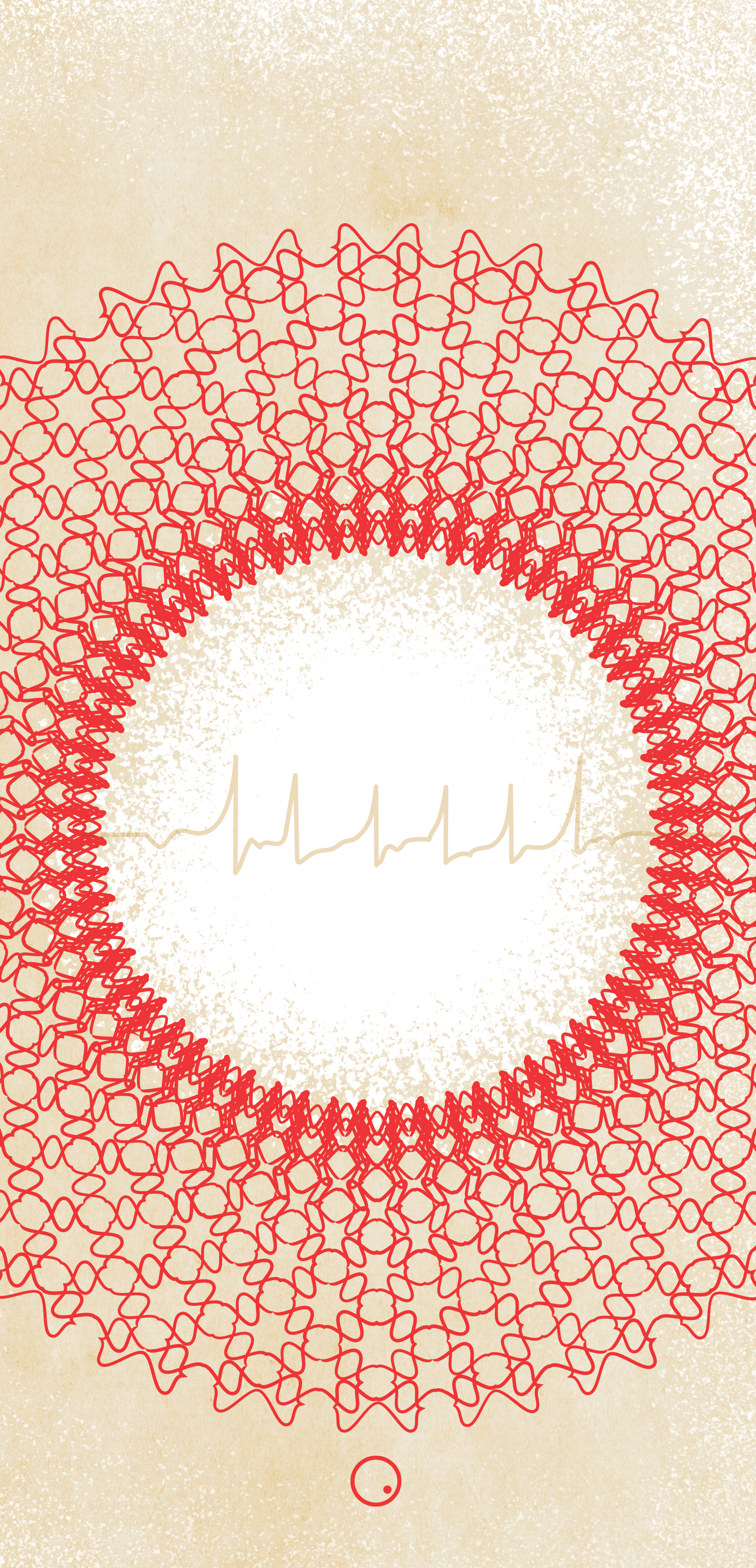

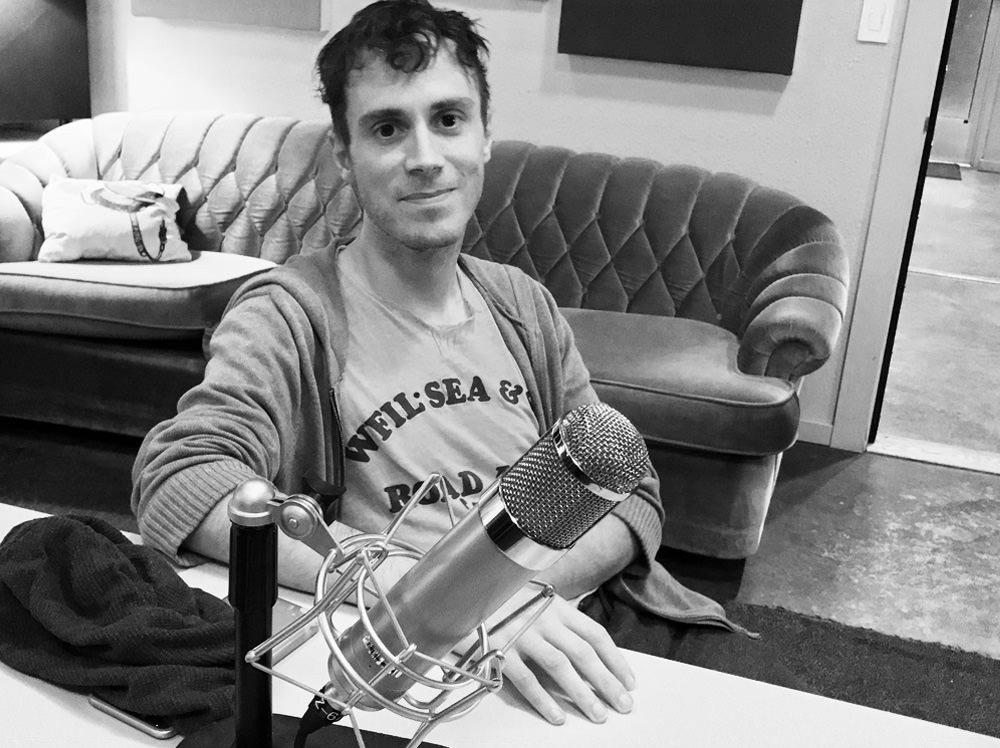
_display_horizontal.jpg)
